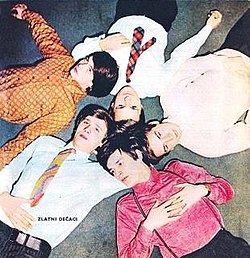Zlatni Dečaci
| Zlatni Dečaci | |
|---|---|
 |
|
| Background information | |
| Also known as | The Tigers, Golden Boys |
| Origin | Belgrade, Serbia, Yugoslavia |
| Genres | Beat music, instrumental rock, rock |
| Years active | 1962 – 1967 |
| Labels | Fontana Records, Jugoton |
| Associated acts | Tomi Sovilj i Njegove Siluete, Korni Grupa |
| Past members | Boba Stefanović Velibor Kacl Predrag Lukić Dušan Banović Vidoje Brajević Gradimir Janković Moma Davidović |
Zlatni Dečaci (Serbian Cyrillic: Златни Дечаци, trans. The Golden Boys) were a former Yugoslav rock band from Belgrade, notable as one of the pioneers of the former Yugoslav rock scene.
The band was formed in 1962 by high school friends: Slobodan "Boba" Stefanović (vocals), Velibor "Borko" Kacl (guitar), Predrag Lukić (keyboards), Dušan Banović (drums), and Vidoje "Vili" Brajević. Initially, the band was named The Tigers, but changed the name after a suggestion of journalist and chess master Nikola Karaklajić.
The band regularly performed at the dances held in club Euridika in Belgrade. During these evenings Stefanović performed both with Zlatni Dečaci and with Saša Radojčić's jazz trio. Moma Davidović and Tomi Sovilj performed with the band occasionally, but after some time, Stefanović remained the only vocalist.
Zlatni Dečaci wanted to break through to Yugoslav radio stations, which were at the time closed for beat music, so they started recording beat covers of classical music pieces. Karaklajić took those recordings to the Netherlands, where he participated in a chess tournament, managing to broadcast them on radio, so the editors of the label Fontana Records became interested in the band. The band, under the name Golden Boys, released the single "Swan Lake" (a theme from Pyotr Ilyich Tchaikovsky's opera Swan Lake) and "Humoresque" (a version of a humoresque by Antonín Dvořák) through the label, becoming the first Yugoslav rock band to release a record for the foreign market. A year later, those two recordings, alongside versions of the theme from Charles Gounod's opera Faust and the Ion Ivanovici's waltz "Waves of the Danube", were released on the EP Humoreska, released by Jugoton. With these compositions the band gained nationwide popularity and performed across Yugoslavia. Their next EP, released during the same year, featured the songs "Čudna devojka" ("Strange Girl", a cover of Marty Robbins' song "Devil Woman"), "Sadko" (a theme from Nikolai Rimsky-Korsakov's opera Sadko), "Napušteni dom" ("Deserted Home", a cover of The Four Pennies song "A Place Where No One Goes"), and "Foxtrot Oriental". The single was sold in more than 100,000 copies.
...
Wikipedia
